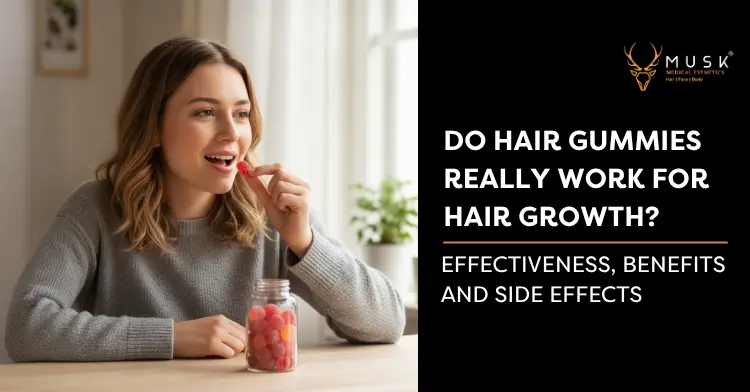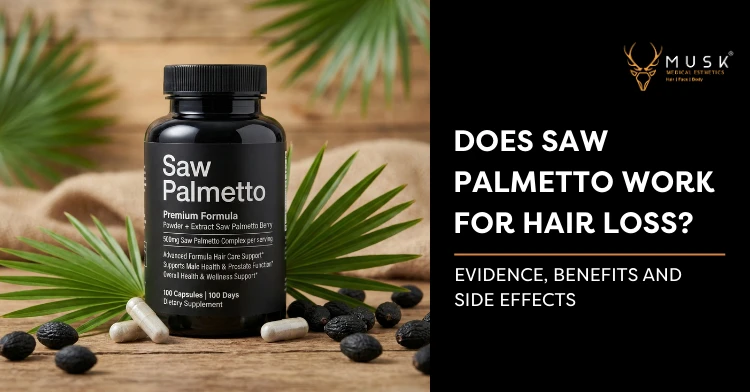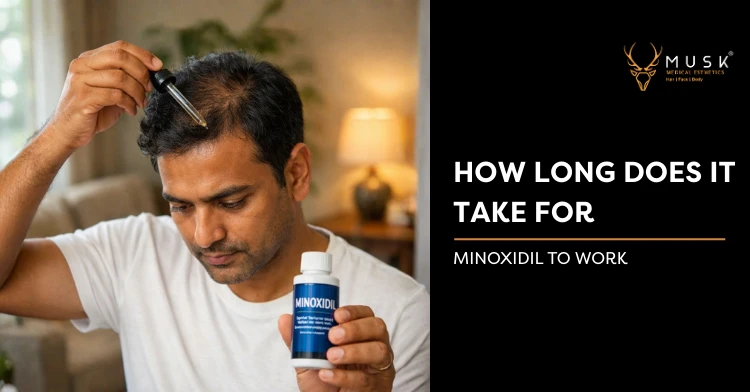Do Hair Gummies Really Work for Hair Growth? Effectiveness, Benefits and Side Effects

Key Takeaways
Don't have time for the full deep dive? Here are the key facts you need to know:
- Works Only for Deficiencies: Hair gummies are vitamin supplements. Their only proven benefit for hair is in correcting an existing nutritional deficiency (like low biotin, zinc, or vitamin D).
- Deficiencies Are Rare: Most people in developed nations get enough hair-healthy vitamins from their diet. A true biotin deficiency, the main ingredient in most gummies, is exceptionally rare.
- Not a Cure for Hair Loss: Gummies will not stop or reverse common genetic hair loss (androgenetic alopecia, or male/female pattern baldness) or hormonal/autoimmune hair loss (like alopecia areata). These conditions are not caused by a vitamin deficiency.
- Real Side Effects: More is not always better. Excess vitamins can cause problems like acne or skin breakouts. Too much Vitamin A can cause hair loss. They also contain sugar and calories.
- Critical Lab Test Interference: This is the most significant risk. High levels of biotin can seriously interfere with blood test results, including crucial tests for heart attacks (troponin) and thyroid function.
- Diagnosis First: Don't guess, get assessed. Before spending money on supplements, a consultation with a hair restoration expert can identify the true cause of your hair loss.
In the quest for thicker, fuller, and healthier hair, you’ve almost certainly seen them: brightly coloured, candy-like hair gummies. They flood social media feeds and pharmacy aisles, promising luscious locks in a tasty, chewable form.
But as medical professionals who deal with the complex science of hair loss every day at Musk Clinic, we know that effective treatment is rarely that simple.
The billion-dollar question is: Do they work?
The short answer is: It depends entirely on why your hair is struggling. For a small group of people with specific nutritional gaps, they might help. But for the vast majority, especially those with genetic or hormonal hair loss, they are unlikely to be the miracle cure they’re marketed as.
This blog will provide an in-depth medical review of hair gummies. We'll deconstruct the ingredients, examine the potential benefits, reveal the surprising side effects, and compare them to treatments that are clinically proven to work.
What's the Real Story Behind Hair Growth Gummies?
It's easy to be tempted by a sweet, simple solution. The marketing is brilliant, but it often glosses over the complex biology of hair.
1. A Dermatologist's First Take on the Gummy Trend
From a medical perspective, we see hair gummies as dietary supplements, not as medicine. They are in the same category as a daily multivitamin.
Their entire premise is based on the "nutritional gap" theory. This theory suggests that our modern diets are lacking the key micronutrients our hair follicles need to thrive. By "filling" these gaps, the gummies claim to support a healthier hair growth cycle.
The problem is, you first need to know if you even have a gap. Taking extra vitamins, you don't need won't provide an extra "boost." Your body simply excretes what it doesn't use (in the best-case scenario) or stores it to potentially toxic levels (in the worst-case scenario).
2. Defining "Hair Growth": What Are We Actually Trying to Achieve?
To understand if a gummy can help, you need to understand how hair grows. Your hair is not just one continuous, growing strand. It operates in a three-phase cycle:
- Anagen (Growth Phase): This is the active phase where the follicle is pushing out hair. It can last anywhere from 2 to 7 years.
- Catagen (Transition Phase): A short, 2-3 week phase where the hair stops growing and detaches from the blood supply.
- Telogen (Resting Phase): The follicle "sleeps" for about 3 months before the hair finally sheds, and a new anagen hair begins to grow underneath it.
Nutritional supplements can help support the health of the anagen phase. They cannot revive a follicle that has died (due to genetic hair loss) or reset a cycle that has been disrupted by hormones or autoimmune disease.
What Exactly Are Hair Gummies?
Let's "deconstruct the label" and look at the most common ingredients packed into these chewy supplements.
1. Deconstructing the Label: The "Big 5" Ingredients in Most Hair Gummies
Most hair gummies are a blend of vitamin B, antioxidants, and minerals. While formulas vary, you will almost always find these key players:
2. Biotin (Vitamin B7)
This is the star ingredient. Biotin is essential for producing keratin, which is the protein that makes up your hair, skin, and nails.
- The Hype: More biotin = more keratin = stronger, faster-growing hair.
- The Reality: Biotin deficiency is incredibly rare. Most people get all they need from foods like eggs, nuts, and salmon. Only those with a diagnosed deficiency will see hair benefits from extra biotin.
3. Folic Acid (Vitamin B9)
This vitamin is a powerhouse for cell generation. It's crucial for helping your hair follicles create new cells, which is fundamental to growing new hair.
- Hype: More folic acid = faster cell division = super-speed hair growth.
- Reality: Like biotin, most people aren't deficient. It's most critical during pregnancy to prevent birth defects, but its direct link to hair growth in healthy adults is not strongly supported by data.
4. Vitamins A, C, D, & E
This is the "antioxidant and support" crew:
- Vitamin A: Helps scalp glands produce sebum, your natural scalp moisturizer. But this is a "danger" vitamin: too much Vitamin A is toxic and can cause hair loss.
- Vitamin C: A powerful antioxidant that fights "oxidative stress" (damage from free radicals). It also helps your body build collagen, a key protein for hair structure.
- Vitamin D: Low levels of Vitamin D are linked to hair loss. Many people are deficient, so this may be one of the more useful ingredients in gummy.
- Vitamin E: Another antioxidant that helps protect your follicles from damage.
5. Zinc and Iodine
- Zinc: This is a critical mineral. Zinc plays a huge role in hair tissue growth and repair. Zinc deficiency is a well-known cause of hair shedding.
- Iodine: Supports your thyroid. Since thyroid problems are a major cause of hair loss, the logic is that supporting thyroid health supports hair.
6. What's Missing? (e.g., Protein, Iron)
Ironically, hair gummies miss the two most important things your hair needs:
- Protein: Your hair is made of protein (keratin). No amount of vitamins will help if you aren't eating enough protein.
- Iron: Iron deficiency (anemia) is one of the most common causes of hair shedding in women. Most gummies don't contain iron.
How Do Hair Gummies Claim to Work?
The marketing of hair gummies is built on three main (and often unproven) claims.
1. The "Nutritional Gap" Theory
As discussed, the primary claim is that you are deficient in these specific micronutrients and that the gummy is the bridge to better hair health.
2. Supporting Keratin Infrastructure
The second claim is that by flooding your system with biotin, you give your body the raw materials to produce more keratin, the building block of hair. While biotin is needed for this process, your body only needs a small amount—an amount you almost certainly get from your diet.
3. Boosting Scalp Circulation and Fighting Oxidative Stress
The final claim is that the antioxidant vitamins (C and E) protect your follicles from environmental damage, while other B vitamins support blood flow to the scalp. This might help hair quality by reducing breakage, but it's not a driver of new growth.
Science vs. Hype: Do Hair Gummies Actually Work for Hair Growth?
This is where marketing and medicine collide.
1. The Critical Role of Nutrient Deficiencies
We cannot stress this enough: Hair supplements only show a benefit if you are clinically deficient in one of the ingredients.
If your hair loss is due to a poor diet or an absorption issue, then yes, taking a targeted supplement (gummy or otherwise) can help restore your hair's normal health.
2. What Does Clinical Research Say About Biotin for Hair?
The scientific evidence for biotin supplementation in healthy individuals is extremely weak. A 2017 review of biotin and hair health found no sufficient evidence to support recommending biotin for hair loss unless someone has a proven deficiency.
3. The Verdict on Vitamins and Hair Growth in Healthy Individuals
For the average, healthy person, there is no strong scientific evidence that taking extra vitamins (beyond the recommended daily allowance) will make your hair grow faster, thicker, or longer. Your body has a set rate of hair growth determined by genetics, and you can't "boost" it with extra vitamins you don't need.
4. Are Hair Gummies a Solution for Hair Loss?
No. Hair loss is a medical condition. Hair gummies are a food supplement.
They will not treat the root causes of most hair loss:
- Androgenetic Alopecia (Genetic Hair Loss): This is caused by a sensitivity to the hormone DHT, which shrinks follicles. Vitamins do not block DHT.
- Alopecia Areata (Autoimmune Hair Loss): This is caused by the immune system attacking hair follicles. Vitamins cannot stop this autoimmune response.
- Hormonal Hair Loss (PCOS, Thyroid): This is caused by a systemic hormone imbalance, which supplements cannot fix.
What Are the Proven Benefits of Taking Hair Gummies?
While they aren't a miracle cure, they aren't entirely useless. They do have a few potential benefits.
1. Correcting a Documented Nutritional Deficiency
If you have a blood test and your doctor confirms you are low in zinc, Vitamin D, or (rarely) biotin, taking a supplement is a great idea. In this case, the gummy is a valid way to get those nutrients and may improve your hair.
2. The Convenience and "Palatability" Factor
This is their biggest selling point. They taste good and are easy to remember to take. For people who hate swallowing pills, a gummy is a much more pleasant experience. This "user-friendliness" can lead to better consistency.
3. Potential Improvements in Hair Strength and Shine
The antioxidant vitamins (C and E) might help protect your existing hair strands from damage, which could lead to less breakage and a "shinier" appearance.
4. Benefits for Skin and Nails
The ingredients in hair gummies are the same ones used for skin and nail health. You might not see a new head of hair, but you may notice that your nails are stronger or your skin looks a bit clearer.
Are There Side Effects? The Potential Risks of Hair Gummies
This is part of the conversation that marketing campaigns always skip. Because these are "just vitamins," people assume they are 100% safe. They are not.
1. The Truth About "Too Much of a Good Thing" (Hypervitaminosis)
Your body can't always get rid of excess vitamins.
- Water-Soluble Vitamins (like B, C): Your body pees out the excess. This is mostly harmless, but a waste of money.
- Fat-Soluble Vitamins (like A, D, E, K): These get stored in your body fat and liver. They can build up toxic levels.
- Vitamin A Risk: As mentioned, excess Vitamin A is a known cause of hair loss. Taking a hair gummy plus your daily multivitamin plus eating vitamin-A-rich foods could push you over the safe limit.
2. Can Hair Gummies Cause Acne and Skin Breakouts?
Yes. This is a very common anecdotal complaint. While not fully proven, the theory is that high doses of biotin can interfere with your body's absorption of Vitamin B5, which helps regulate your skin's barrier. This imbalance can lead to cystic acne and breakouts.
3. The Hidden Problem: Sugar, Calories, and Fillers
They are "gummies" for a reason. To make them taste like candy, they are often loaded with sugar, corn syrup, and artificial flavors. This can add 2-4 grams of sugar and 15-30 calories to your day, which adds up. For diabetic patients or those on a low-sugar diet, this is a significant drawback.
4. Can Hair Gummies Interfere with Blood Test Results?
This is the most dangerous and least-known side effect.
High levels of biotin in your blood can skew the results of many important lab tests. It can:
- Falsely lower your Troponin levels—the key marker used to diagnose a heart attack. This could lead to a doctor mistakenly sending you home from the ER.
- Falsely alter your Thyroid Hormone levels, leading to a misdiagnosis of thyroid disease.
- Interfere with hormone tests, including pregnancy tests.
The FDA has issued an official warning about this. You must tell your doctor you are taking biotin supplements before any blood draws.
Hair Gummies vs. Biotin Pills vs. Diet: Which is Best?
Let's compare your options for hair nutrition.
1. Comparison: Gummy vs. Traditional Pill
This table breaks down the key differences.
| Feature | Hair Gummies | Biotin / Vitamin Pills |
|---|---|---|
| Main Appeal | Taste, convenience, "fun" | Targeted, potent, no sugar |
| Formula | Broad-spectrum (many vitamins) | Often a single, high-dose ingredient |
| Additives | High in sugar, artificial flavors, colours | Minimal fillers, no sugar |
| Cost | Generally, more expensive per serving | Generally, more cost-effective |
| Risks | Sugar/calories, lab interference, acne | Lab interference (biotin), risk of over-dosing |
2. Comparison: Bioavailability and Absorption
There is no strong evidence to suggest that your body absorbs vitamins better from a gummy than a pill. The "gummy" form is purely for user experience. The vitamins are absorbed the same way once they reach your stomach.
3. Can You Just Get These Nutrients from Food?
Absolutely. A balanced, whole-food diet is the most effective and safest way to get all the nutrients your hair needs. Food provides these vitamins in a complex, synergistic way that a supplement can't replicate.
4. Top 10 Foods for Natural Hair Health
Instead of buying gummies, try adding these to your shopping cart:
- Eggs: The perfect hair food. Packed with protein, biotin, zinc, and selenium.
- Salmon: Rich in Omega-3 fatty acids, protein, and Vitamin D.
- Spinach: Loaded with folate, iron, and Vitamins A and C.
- Avocados: A great source of Vitamin E and healthy fats.
- Nuts (Almonds, Walnuts): Deliver biotin, Vitamin E, zinc, and Omega-3s.
- Sweet Potatoes: A fantastic source of Beta-Carotene, which your body converts to Vitamin A.
- Beef Liver: One of the most concentrated sources of biotin and iron.
- Oysters: The single best source of zinc.
- Berries (Blueberries, Strawberries): Full of Vitamin C and antioxidants.
- Greek Yogurt: High in protein and Vitamin B5 (pantothenic acid).
Who Are Hair Gummies Most Likely to Work For?
Based on the evidence, the list of people who will benefit from hair gummies is very short.
1. The Person with a Poor Diet or Deficiency
This is the target audience. If your diet consists of highly processed foods and you eat very few fruits, vegetables, or proteins, you are likely deficient. In this case, a gummy (or any multivitamin) may help improve your hair's health simply by bringing you back to a normal baseline.2. The Person with Temporary, Stress-Induced Shedding
Sometimes, severe physical or emotional stress can cause a temporary hair shedding condition called Telogen Effluvium. This stress can also deplete your body's vitamin stores. While the supplement won't stop the shedding, it can help ensure your body has the nutrients it needs to grow back healthy hair after the stressful period haspassed.
3. The Person with Healthy Hair (The Placebo Effect?)
This is a real phenomenon. A person with perfectly healthy hair starts taking a tasty gummy. They expect to see results. Because of this, they start paying more attention to their hair, maybe treating it more gently or noticing small changes they otherwise would have missed. This feeling of effectiveness is powerful, even if no real biological change has occurred.
Who Will Hair Gummies Not Work For?
This list is much, much longer. It's crucial to set realistic expectations.
1. Why Gummies Won't Stop Genetic Hair Loss (Androgenetic Alopecia)
This is the most common form of hair loss, affecting millions of men and women. It's caused by a genetic sensitivity to a hormone called DHT (dihydrotestosterone), which attacks and shrinks hair follicles until they stop growing hair.
Vitamins do not block or affect DHT. Taking a gummy for pattern baldness is like taking a vitamin C drop for a broken leg. It's the wrong treatment for the problem.
2. Understanding Hormonal Hair Loss (e.g., PCOS, Postpartum)
Conditions like Polycystic Ovary Syndrome (PCOS), thyroid disorders, and the hormonal crash after pregnancy can all cause significant hair loss. These are complex medical issues that require a doctor's intervention to rebalance your hormones. Gummy vitamins are not medical treatment.
3. When Hair Loss Signals a Deeper Medical Issue
Hair loss can be the "check engine light" for your body. It can signal:
- Anemia (Iron deficiency)
- Thyroid Disease
- Autoimmune conditions like Alopecia Areata or Lupus
Covering the symptoms with a supplement could delay a critical diagnosis.
The Musk Clinic Perspective: What We Tell Our Patients
When a patient comes to Musk Clinic concerned about hair loss, we never start by recommending a supplement. We start with a diagnosis.
1. Why We Prioritize Diagnosis Before Supplements
Our entire philosophy is built on personalized, effective care. We use advanced diagnostics, like scalp evaluations and blood tests, to find the root cause of your hair loss.
Is it genetic? Is it hormonal? Is it nutritional? Is it stressful?
Only by answering this question can we create a treatment plan that will produce results. Wasting 6 months on hair gummies only to find out you have pattern baldness is 6 months you could have been on a treatment that works.
2. Are Gummies a "Magic Cure"? Our Professional Opinion
No. There is no magic cure for hair loss.
At Musk Clinic, we are a results-driven medical practice. We are skeptical of any product that promises a simple, one-size-fits-all solution. Hair growth is a complex medical process. Effective treatments are medical, not confectionary.
3. What Are Medically Proven Alternatives for Real Hair Growth?
If you have actual hair loss (not just a vitamin deficiency), these are the treatments that are supported by decades of clinical evidence.
4. Medicinal Treatments (e.g., Minoxidil, Finasteride)
- Minoxidil: A topical solution (or oral pill) that is FDA-approved to stimulate hair growth for both men and women. It works by improving blood flow and prolonging the anagen (growth) phase.
- Finasteride: An oral, prescription-only medication for men that works by blocking the formation of DHT, the hormone that causes male pattern baldness.
5. PRP (Platelet-Rich Plasma) Therapy
This is a highly effective, non-surgical treatment we specialize in at Musk Clinic.
- We draw a small amount of your own blood.
- We spin it in a centrifuge to isolate the Platelet-Rich Plasma (PRP)—a "liquid gold" full of your body's own growth factors.
- We then re-inject this PRP directly into your scalp.
This process floods the dormant follicles with growth factors, "waking them up" and stimulating new, thicker hair growth.
Learn more about our advanced PRP Therapy at Musk Clinic.
6. Advanced Hair Restoration (FUE & ARTAS Robotic Hair Transplant)
For permanent hair loss, this is the gold standard.
- FUE (Follicular Unit Extraction): We manually and precisely extract individual, healthy hair follicles from the back of your head (the donor area) and transplant them to your thinning areas.
- ARTAS 9X Robotic Hair Transplant: Musk Clinic was the first in India to introduce this advanced technology. The ARTAS robot uses AI and 3D mapping to harvest follicles with robotic precision, ensuring up to 99% accuracy, minimal scarring, and incredible, natural-looking results.
These treatments address the actual problem of hair loss, which is something a vitamin gummy can never do.
Our Final Verdict: Should You Spend Your Money on Hair Gummies?
Hair gummies are a supplement, not a solution.
If you are a healthy individual who eats a reasonably balanced diet, hair gummies are unlikely to do anything for your hair growth. They are an expensive multivitamin.
If you are genuinely concerned about your hair thinning or shedding, you will get far more value from a single medical consultation than you will from a six-month supply of gummies.
1. Don't Guess, Get Assessed: The Importance of a Consultation
The "Musk Experience" is about providing you with real answers and real results. We are here to help you understand the "why" behind your hair loss and build a personalized plan that restores not just your hair, but your confidence.
Before you try another fad, talk to an expert.
2. A Final Checklist: Is a Hair Gummy Right for You?
Ask yourself these questions:
- Have I had a blood test that confirms I have a vitamin deficiency?
- Is my diet genuinely poor and lacking essential nutrients?
- Do I hate swallowing pills so much that sugary gummy is my only option?
- Am I aware of the risks, including acne and lab test interference?
- Am I sure my hair loss isn't genetic or hormonal?
If you answered "no" to most of these, save your money.
Ready to find out the real cause of your hair loss and discover treatments that work?
Our team of experts at Musk Clinic is here to guide you. We combine world-class technology with a patient-first approach to create a plan that's right for you.
Book your personalized consultation at muskclinic.com today and stop guessing.
Frequently Asked Questions (FAQs) About Hair Gummies

Dr. Anand B. Shah
- 10 Years of Experience
Dr Anand B. Shah, is a board-certified Maxillofacial & Craniofacial surgeon who is highly skilled in cosmetic facial and hair restoration surgery and has exclusively practised the same, internationally and nationally.











